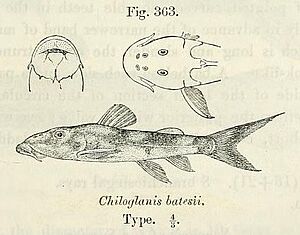Chiloglanis batesii facts for kids
Quick facts for kids Chiloglanis batesii |
|
|---|---|
 |
|
| Conservation status | |
| Scientific classification |
|
| Kingdom: | Animalia |
| Phylum: | Chordata |
| Class: | Actinopterygii |
| Order: | Siluriformes |
| Family: | Mochokidae |
| Genus: | Chiloglanis |
| Species: |
C. batesii
|
| Binomial name | |
| Chiloglanis batesii Boulenger, 1904
|
|
| Script error: The function "autoWithCaption" does not exist. | |
Script error: No such module "Check for conflicting parameters".
The Chiloglanis batesii is a special type of catfish often called the suckermouth catfish or rapid catfish. It lives in freshwaters across Western and Central Africa. This small fish usually grows to about 4.7 centimeters (about 1.8 inches) long.
Contents
About the Suckermouth Catfish
Chiloglanis batesii belongs to a group of fish known as ray-finned fishes. It's part of the catfish order and the Mochokidae family, which includes "upside-down catfishes" or "squeakers." Its scientific name is Chiloglanis batesii.
What Makes it Special?
This catfish has a unique mouth that works like a suction cup! It uses this "sucking disc" to hold onto rocks in fast-moving rivers. This helps it stay in place even when the water is rushing by. It's like having built-in grappling hooks for its mouth!
Chiloglanis batesii is one of the largest groups of fish in Africa, second only to the Synodontis genus. Unlike some other suckermouth catfishes from South America, it doesn't have bony plates on its body.
Where Do They Live?
You can find Chiloglanis batesii in many countries across Africa. These include Cameroon, the Central African Republic, Chad, the Democratic Republic of the Congo, the Republic of the Congo, Guinea, Mali, and Nigeria. They prefer tropical freshwater environments, often found near the bottom of rivers.
Water Conditions
These fish like water that is:
- Warm: Around 20 to 26 degrees Celsius (73 to 79 degrees Fahrenheit).
- Slightly acidic to neutral: A pH level between 6.4 and 7.2.
- Well-oxygenated: Meaning it has plenty of fresh air mixed in.
What Do They Eat?
Chiloglanis batesii are not picky eaters! They feed on things they find on rocks and in the water. Their diet includes:
- Algae (tiny plant-like organisms)
- Fly larvae (baby flies)
- Other small food items found in the water.
Life Cycle and Characteristics
These fish usually grow to about 7 centimeters (2.7 inches) long. When it's time to have babies, male and female Chiloglanis batesii form distinct pairs for breeding.
How to Tell Males Apart
It can be tricky to tell different Chiloglanis species apart, but male Chiloglanis batesii are easier to identify. They have a longer upper part of their tail fin compared to other male species.
Important Note for Handling
If you ever see one of these fish, be careful! Their dorsal (back) and pectoral (side) fins are sharp. They can cause small wounds if not handled properly.
Role in Nature
Like many fish, Chiloglanis batesii plays a part in its ecosystem. It serves as a food source for other larger fish and even for people in some areas.
 | William M. Jackson |
 | Juan E. Gilbert |
 | Neil deGrasse Tyson |


